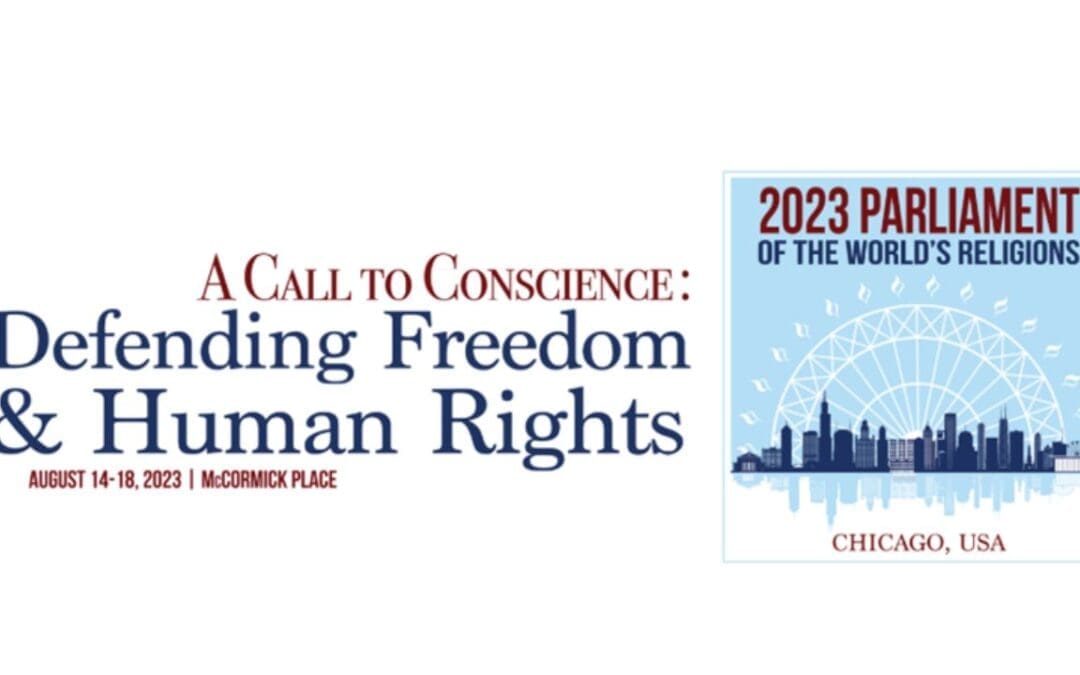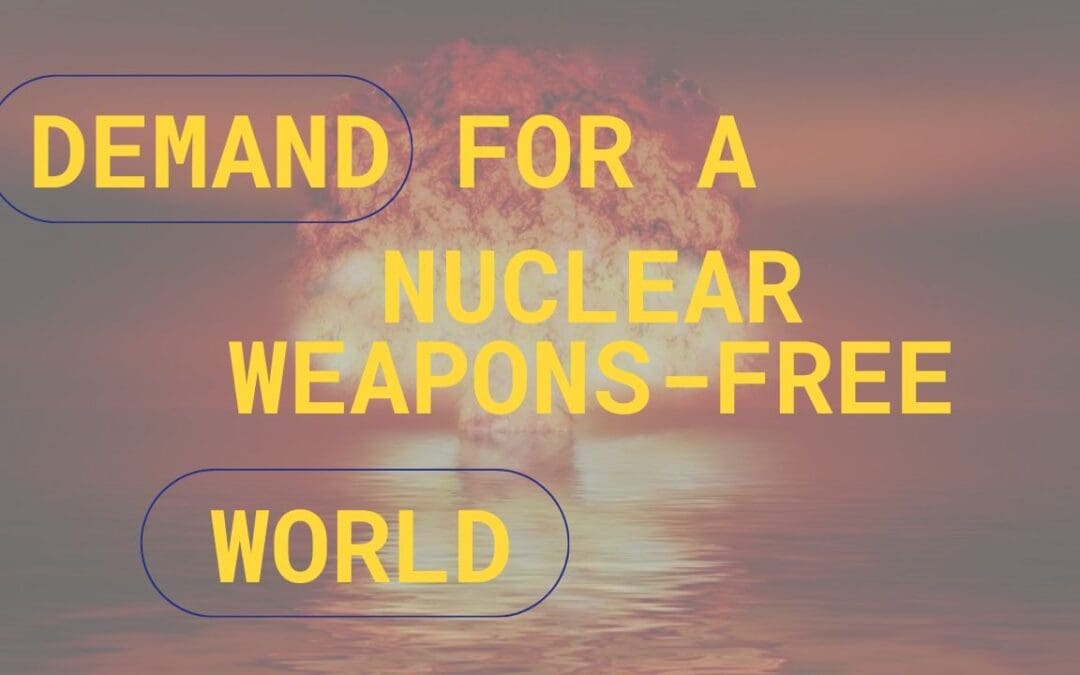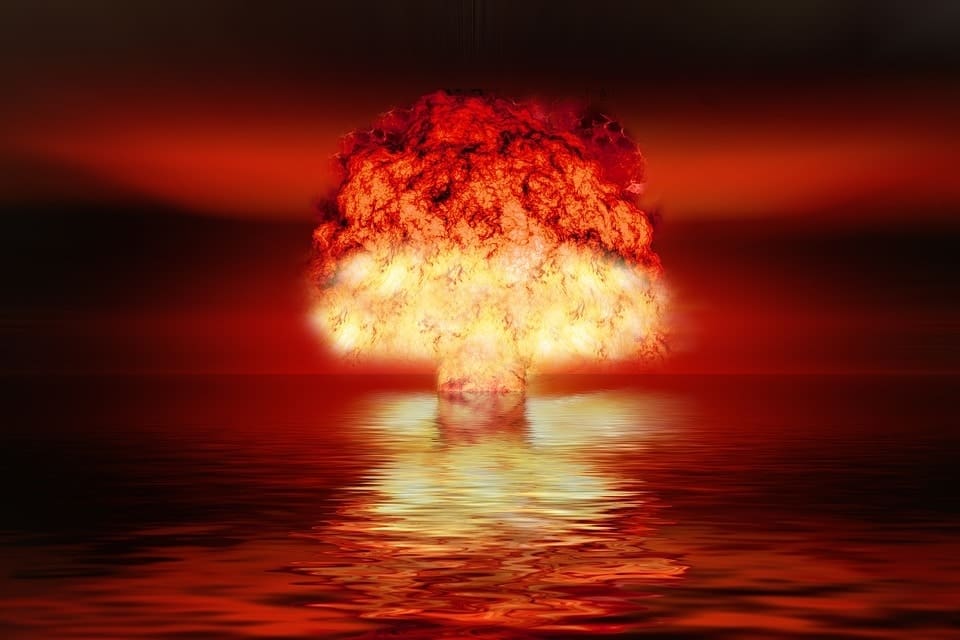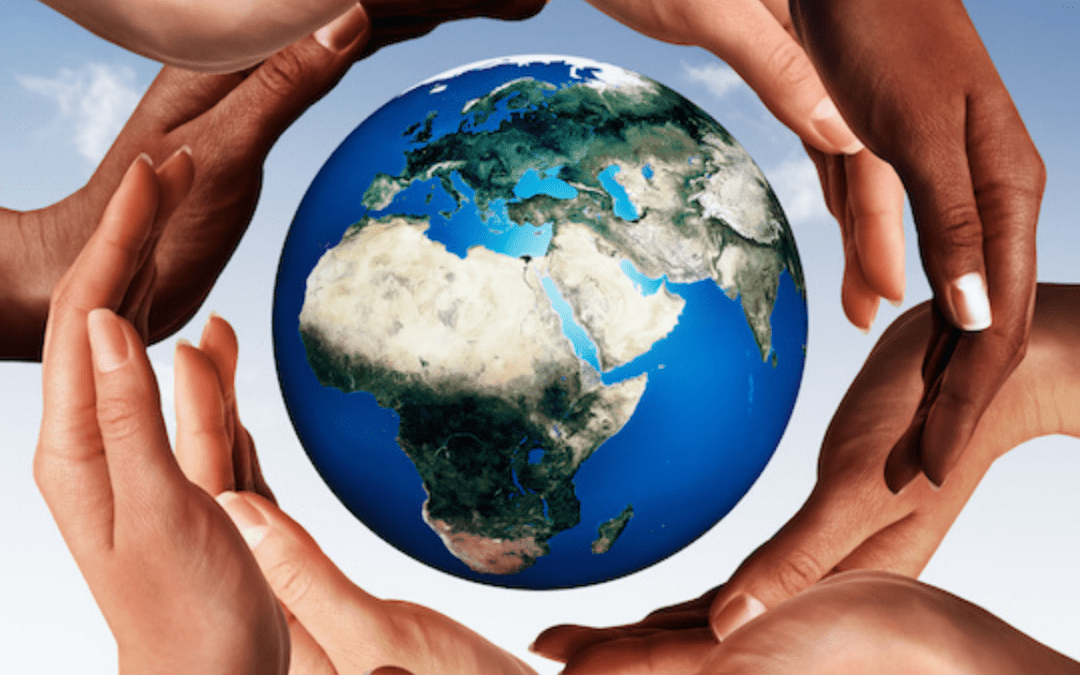
by David Oughton | Sep 5, 2023 | Human Rights
The first time that many religious representatives met with each other was at the World Parliament of Religions in Chicago in 1893. Three of the goals of this gathering were to show “what and how many important truths the various Religions hold and teach in common;” to discover “what light Religion has to throw on the great problems of the present age;” and “to bring the nations of the earth into a more friendly fellowship, in the hope of securing permanent international peace.” The president of this Parliament proclaimed, “Henceforth the religions of the world will make war, not on each other, but on the giant evils that afflict humanity.” But after two world wars, the Holocaust and other genocides, the Cold War with massive nuclear proliferation, and over eighty wars since the end of the Second World War, many people representing many different religions realized the need for modern Parliaments in order to address our current global problems.
So in 1993 many religious leaders in Chicago organized the first modern Parliament. The other modern Parliaments were then held in Cape Town, South Africa in 1999, in Barcelona, Spain in 2004, in Melbourne, Australia in 2009, in Salt Lake City, Utah in 2015, in Toronto, Canada in 2018, virtually in 2021, and most recently back in Chicago this year from August 14 to 18. I have been fortunate to participate in all of these modern Parliaments.
The modern Parliaments are religious conventions that are open to anyone who is committed to learning about other religions and dialoging with people from other religions. Each day of the Parliament involves meetings, presentations, and panels about the beliefs and practices of different religions or about humanity’s most pressing problems: violence, human rights atrocities, poverty, racism, gender inequality, war and genocide, nuclear weapons, and environment degradation due to global warming. Leaders of various groups within Judaism, Christianity, Islam, the Baha’i Faith, Zoroastrianism, Hinduism, Buddhism, Sikhism, Jainism, Confucianism, Taoism, and other religious groups gave speeches in the plenary sessions about how they think these global problems can be solved.
The theme of the 2023 Parliament in Chicago was “A Call to Conscience: Defending Freedom and Human Rights.” There were over 7,000 attendees at this Parliament in Chicago, representing about 100 countries and over 200 different religious groups. There were over 100 sessions or presentations during each day of the Parliament. There were many opportunities to attend different religious services at the Parliament. Many dances and songs performed by various religious groups were also part of this global experience. Every day a large group of Sikhs offered a free meal of traditional Indian food to large groups of participants. Everyone who attended these langars was asked to follow the Sikh custom of removing one’s shoes and covering one’s head with a turban or a cloth.
There was a major emphasis at this latest Parliament on the Declaration of a Global Ethic. It was written by a group of scholars from different religions for the 1993 Parliament. The Global Ethic emphasizes a commitment to a culture of non-violence and respect for life, solidarity and a just economic order, tolerance and a life of truthfulness, equal rights and partnership between men and women, and sustainability and care for the Earth. These principles reflect the ancient commandments taught in some way by all of the major religions: ‘you shall not murder/kill, steal, lie, or commit adultery.’ According to the Global Ethic, people from every religion or no religion can agree on universal ethical values such as non-violent conflict resolution, honesty, human rights, labor rights, working against corruption in government and economics, working for justice, and protecting the environment.
Another document that was emphasized at recent Parliaments is the Charter for Compassion. This Charter is based on the Golden Rule that has been taught by all of the major religions in various formulations. The Charter calls upon all to restore compassion to the center of morality and religion, to reject any interpretation of scripture that breeds hatred or violence, to teach accurate and respectful information about other religions, to appreciate cultural and religious diversity, and to cultivate empathy for the sufferings of others, even those regarded as enemies. Because of the modern Parliaments, many cities around the world have declared themselves to be Compassion Cities.
There were several sessions at the 2023 Parliament that emphasized the need for a democratic world federation. One was led by Sovaida Ma’ani Ewing, a representative of the Baha’i Faith. She argued that war, climate change, mismanagement of natural resources, proliferation of nuclear weapons, and financial upheavals can best be solved by establishing collective decision-making institutions that can evolve into a democratic world federation of nation-states. Bruce Knotts, the President of Citizens for Global Solutions and a Trustee of the Parliament, was involved in many sessions in Chicago. Rebecca Shoot, the Executive Director of Citizens for Global Solutions, was a panelist on a session about how to eliminate nuclear weapons.
Many modern philosophers and religious leaders have realized that there will be no peace among the nations without peace among the religions. Furthermore, there will be no peace among the religions without dialogue among the religions. I am convinced that the Parliaments of the World’s Religions are important forums for promoting world citizenship, compassion, and a global ethic for the global community. The world’s religions have a responsibility of building a secure foundation for these values so that a democratic system of enforceable world laws can outlaw war and solve our global problems

by Daniel Perell | Jul 21, 2023 | UN Reform
Regular attendees of the High Level Political Forum (or similar spaces) might well get the sense that the world is nearly beyond repair. Each report, each speech, begins with a recitation of the numerous tragedies and ills befalling humanity – the polycrisis as it has come to be known. Hearing it again and again, I often wonder whether this practice is meant to somehow establish the credentials of the speaker. I also wonder whether, when everyone is quite aware of the precipice on which we stand, it might be helpful to start from a different perspective.
I recently joined several prominent civil society actors and high ranking government officials at an informal gathering where our convenor, the Minister of Development from a large country, asked us all to start by sharing something from the global landscape that brought us hope. No one at that table was unaware of the realities facing the world. But, for a short time, we were able to share mutual victories and offer suggestions for how they could be repeated.
The exercise was impactful. One delegate turned to me after and remarked that these kinds of conversations could be helpful to anyone feeling the weight of the world on their shoulders. A conversation about hope, he seemed to suggest, is a source of hope itself.
Starting with such a posture can help us in many circumstances, without minimizing the very real challenges we face. This posture is not unusual in other dimensions of life: in athletics, it is important to envision what success looks like before the start of a competition. Patients in rehabilitation are encouraged to channel a can-do attitude. This is not soft science: it can have a measurable impact on outcomes.
Listening to 30 minutes of hopeful interventions built a sense of shared optimism among us in that room, which carried over as we began to address a variety of pressing problems. It also illustrated a deeper principle, and one that is relevant to the multilateral system; namely, that progress is achieved most sustainably by building on our strengths, not by criticizing our weaknesses.
Yes, of course, there is utility in identifying gaps and shortfalls. Learning requires this honesty. But we cannot draw on capacities we have not yet developed; we cannot deploy resources that do not yet exist. At the end of the day, we work with the tools we have, not the tools we lack.
The question the Minister of Development posed was broad, but the responses it elicited were specific and practical. Colleagues and partners did not reply with abstract hopes, but with specific reasons for hope, such as abilities gained, lessons learned, successes achieved, and positive trends already underway. Constructive contributions inspire because of the promise they hold—justified and rational—for further progress and advancement going forward.
Today, as the international community moves toward the Summit of the Future and the second half of the 2030 Agenda for Sustainable Development, we would do well to organize ourselves more and more according to the principle of building from one strength to the next. Without ignoring hard realities, our opening protocols can allow us to share and draw from successes being achieved around the world.
We all aim to build a better world. Through positive, constructive language and examples, we encourage progress by inspiring each other and learning what is working. This, in itself, accelerates bringing that hopeful world into being.
*This was originally published on the Bahai’ International Community’s website.

by Lawrence Wittner | Jul 13, 2023 | Disarmament
The July 21, 2023 theatrical release of the film Oppenheimer, focused on the life of a prominent American nuclear physicist, should help to remind us of how badly the development of modern weapons has played out for individuals and for all of humanity.
Oppenheimer’s Rise and Fall
Based on the Pulitzer Prize-winning biography, American Prometheus, written by Kai Bird and the late Martin Sherwin, the film tells the story of the rise and fall of young J. Robert Oppenheimer, recruited by the U.S. government during World War II to direct the construction and testing of the world’s first atomic bomb at Los Alamos, New Mexico. His success in these ventures was followed shortly thereafter by President Truman’s ordering the use of nuclear weapons to destroy Hiroshima and Nagasaki.
During the immediate postwar years, Oppenheimer, widely lauded as “the father of the atomic bomb,” attained extraordinary power for a scientist within U.S. government ranks, including as chair of the General Advisory Committee of the new Atomic Energy Commission (AEC).
But his influence ebbed as his ambivalence about nuclear weapons grew. In the fall of 1945, during a meeting at the White House with Truman, Oppenheimer said: “Mr. President, I feel I have blood on my hands.” Incensed, Truman later told Assistant Secretary of State Dean Acheson that Oppenheimer had become “a crybaby” and that he didn’t want “to see that son of a bitch in this office ever again.”
Oppenheimer was also disturbed by the emerging nuclear arms race and, like many atomic scientists, championed the international control of atomic energy. Indeed, in late 1949, the entire General Advisory Committee of the AEC came out in opposition to the U.S. development of the H-bomb―although the president, ignoring this recommendation, approved developing the new weapon and adding it to the rapidly growing U.S. nuclear arsenal.
In these circumstances, figures with considerably less ambivalence about nuclear weapons took action to purge Oppenheimer from power. In December 1953, shortly after becoming chair of the AEC, Lewis Strauss, a fervent champion of a U.S. nuclear buildup, ordered Oppenheimer’s security clearance suspended. Anxious to counter implications of disloyalty, Oppenheimer appealed the decision and, in subsequent hearings before the AEC’s Personnel Security Board, faced grueling questioning not only about his criticism of nuclear weapons, but about his relationships decades before with individuals who had been Communist Party members.
Ultimately, the AEC ruled that Oppenheimer was a security risk, an official determination that added to his public humiliation, completed his removal from government service, and delivered a shattering blow to his meteoric career.
The Threat to Human Survival
Of course, the development of nuclear weapons had far broader consequences than the downfall of J. Robert Oppenheimer. In addition to killing more than 200,000 people and injuring many more in Japan, the advent of nuclear weaponry led nations around the world to enter a fierce nuclear arms race. By the 1980s, spurred on by conflicts among the major powers, 70,000 nuclear weapons had come into existence, with the potential to destroy virtually all life on earth.
Fortunately, a massive grassroots citizens campaign emerged to counter this drive toward a nuclear apocalypse. And it succeeded in pressuring reluctant governments into an array of nuclear arms control and disarmament treaties, as well as unilateral actions, to reduce nuclear dangers. As a result, by 2023 the number of nuclear weapons had declined to roughly 12,500.
Nevertheless, in recent years, thanks to a sharp decrease in citizen activism and increase in international conflict, the potential for nuclear war has dramatically revived. All nine nuclear powers (Russia, the United States, China, Britain, France, Israel, India, Pakistan, and North Korea) are currently engaged in upgrading their nuclear arsenals with new production facilities and new, improved nuclear weapons. During 2022, these governments poured nearly $83 billion into this nuclear buildup. Public threats to initiate nuclear war, including those by Donald Trump, Kim Jong Un, and Vladimir Putin, have become more common. The hands of the Doomsday Clock of the Bulletin of the Atomic Scientists, established in 1946, now stand at 90 seconds to midnight―the most dangerous setting in its history.
Not surprisingly, the nuclear powers display little interest in further action for nuclear arms control and disarmament. The two nations possessing some 90 percent of the world’s nuclear weapons―Russia (with the most) and the United States (not far behind)―have pulled out of nearly all such agreements with one another. Although the U.S. government has proposed extending the New Start Treaty (which limits the number of strategic nuclear weapons) with Russia, Putin reportedly responded this June that Russia would not engage in any nuclear disarmament talks with the West, commenting: “We possess more weaponry of such sort than the NATO countries. They know that and are always trying to persuade us to start negotiations on reduction. Nuts to them . . . as our people say.” The Chinese government―whose nuclear arsenal, while growing substantially, still ranks a distant third in numbers―has stated that it sees no reason for China to engage in any nuclear arms control talks.
The Demand for a Nuclear Weapons-Free World
To head off a looming nuclear catastrophe, non-nuclear nations have been championing the Treaty on the Prohibition of Nuclear Weapons (TPNW). Adopted by an overwhelming vote of nations at a UN conference in July 2017, the TPNW bans developing, testing, producing, acquiring, possessing, stockpiling, and threatening to use nuclear weapons. The treaty went into force in January 2021 and―though opposed by all the nuclear powers―it has thus far been signed by 92 nations and ratified by 68 of them. Brazil and Indonesia are likely to ratify it in the near future. Polls have found that the TPNW has substantial support in numerous countries, including the United States and other NATO nations.
Numerous organizations are working to create a nuclear weapons-free world, including Citizens for Global Solutions, Peace Action, and Physicians for Social Responsibility in the United States and the International Campaign to Abolish Nuclear Weapons, the International Peace Bureau, Parliamentarians for Nuclear Nonproliferation and Disarmament (PNND), and Parliamentarians for Global Action on the international level.
There does remain some hope, then, that the nuclear tragedy that engulfed J. Robert Oppenheimer and has long threatened the survival of world civilization can still be averted.

by Lawrence Wittner | Jun 29, 2023 | Peace
Perhaps the greatest tragedy of the immensely destructive Ukraine War lies in the fact that it could have been averted.
The most obvious way was for the Russian government to abandon its plan for the military conquest of Ukraine.
The Problem of Russian Policy
The problem on this score, though, was that Vladimir Putin was determined to revive Russia’s “great power” status. Although his predecessors had signed the UN Charter (which prohibits the “use of force against the territorial integrity or political independence of any state”), as well as the Budapest Memorandum and the Treaty on Friendship, Cooperation, and Partnership (both of which specifically committed the Russian government to respecting Ukraine’s sovereignty and territorial integrity), Putin was an ambitious ruler, determined to restore what he considered Russia’s imperial grandeur.
This approach led not only to Russian military intervention in Middle Eastern and African nations, but to retaking control of nations previously dominated by Russia. These nations included Ukraine, which Putin regarded, contrary to history and international agreements, as “Russian land.”
As a result, what began in 2014 as the Russian military seizure of Crimea and the arming of a separatist rebellion in eastern Ukraine gradually evolved into the full-scale invasion of February 2022―the largest, most devastating military operation in Europe since World War II, with the potential for the catastrophic explosion of the giant Zaporizhzhia nuclear power plant and even the outbreak of nuclear war.
The official justifications for these acts of aggression, trumpeted by the Kremlin and its apologists, were quite flimsy. Prominent among them was the claim that Ukraine’s accession to NATO posed an existential danger to Russia. In fact, though, in 2014―or even in 2022―Ukraine was unlikely to join NATO because key NATO members opposed its admission. Also, NATO, founded in 1949, had never started a war with Russia and had never shown any intention of doing so.
The reality was that, like the U.S. invasion of Iraq nearly two decades before, the Russian invasion of Ukraine was out of line with both international law and the imperatives of national security. It was a war of choice organized by a power-hungry ruler.
The Problem of UN Weakness
On a deeper level, the war was avoidable because the United Nations, established to guarantee peace and international security, did not take the action necessary to stop the war from occurring or to end it.
Admittedly, the United Nations did repeatedly condemn the Russian invasion, occupation, and annexation of Ukraine. On March 27, 2014, the UN General Assembly passed a resolution by a vote of 100 nations to 11 (with 58 abstentions), denouncing the Russian military seizure and annexation of Crimea. On March 2, 2022, by a vote of 141 nations to 5 (with 35 abstentions), it called for the immediate and complete withdrawal of Russian military forces from Ukraine. In a ruling on the legality of the Russian invasion, the International Court of Justice, by a vote of 13 to 2, proclaimed that Russia should immediately suspend its invasion of Ukraine. That fall, when Russia began annexing the Ukrainian regions of Donetsk, Luhansk, Kherson, and Zaporizhzhia, the UN Secretary-General denounced that action as flouting “the purposes and principles of the United Nations,” while the UN General Assembly, by a vote of 143 nations to 5 (with 35 abstentions), called on all countries to refuse to recognize Russia’s “illegal annexation” of Ukrainian land.
Tragically, this principled defense of international law was not accompanied by measures to enforce it. At meetings of the UN Security Council, the UN entity tasked with maintaining peace, the Russian government simply vetoed UN action. Nor did the UN General Assembly circumvent the Security Council’s paralysis by acting on its own. Instead, the United Nations showed itself well-meaning but ineffectual.
This weakness on matters of international security was not accidental. Nations―and particularly powerful nations―had long preferred to keep international organizations weak, for the creation of stronger international institutions would curb their own influence. Naturally, then, they saw to it that the UN’s predecessor, the League of Nations, could act on international security issues only by a unanimous vote of its membership. And even this constricted authority proved too much for the U.S. government, which refused to join the League. Similarly, when the United Nations was formed, the five permanent seats on the UN Security Council were given to five great powers, each of which could, and often did, veto its resolutions.
During the Ukraine War, Ukrainian President Volodymir Zelensky publicly lamented this inability of the United Nations to enforce its mandate. “The wars of the past have prompted our predecessors to create institutions that should protect us from war,” he remarked in March 2022, “but they unfortunately don’t work.” In this context, he called for the creation of “a union of responsible countries . . . to stop conflicts” and to “keep the peace.”
What Still Might Be Done
The need to strengthen the United Nations and, thereby, enable it to keep the peace, has been widely recognized. To secure this goal, proposals have been made over the years to emphasize UN preventive diplomacy and to reform the UN Security Council. More recently, UN reformers have championed deploying UN staff (including senior mediators) rapidly to conflict zones, expanding the Security Council, and drawing upon the General Assembly for action when the Security Council fails to act. These and other reform measures could be addressed by the world organization’s Summit for the Future, planned for 2024.
In the meantime, it remains possible that the Ukraine War might come to an end through related action. One possibility is that the Russian government will conclude that its military conquest of Ukraine has become too costly in terms of lives, resources, and internal stability to continue. Another is that the countries of the world, fed up with disastrous wars, will finally empower the United Nations to safeguard international peace and security. Either or both would be welcomed by people in Ukraine and around the globe.

by Lawrence Wittner | Jun 10, 2023 | Disarmament
It should come as no surprise that the world is currently facing an existential nuclear danger. In fact, it has been caught up in that danger since 1945, when atomic bombs were used to annihilate the populations of Hiroshima and Nagasaki.
The Situation Today
Today, however, the danger of a nuclear holocaust is probably greater than in the past. There are now nine nuclear powers―the United States, Russia, Britain, France, China, Israel, India, Pakistan, and North Korea―and they are currently engaged in a new nuclear arms race, building ever more efficient weapons of mass destruction. The latest entry in their nuclear scramble, the hypersonic missile, travels at more than five times the speed of sound and is adept at evading missile defense systems.
Furthermore, these nuclear-armed powers engage in military confrontations with one another―Russia with the United States, Britain, and France over the fate of Ukraine, India with Pakistan over territorial disputes, and China with the United States over control of Taiwan and the South China Sea―and on occasion issue public threats of nuclear war against nuclear nations. In recent years, Vladimir Putin, Donald Trump, and Kim Jong-Un have also publicly threatened non-nuclear nations with nuclear destruction.
Little wonder that, in January 2023, the editors of the Bulletin of the Atomic Scientists set the hands of their famous “Doomsday Clock” at 90 seconds before midnight, the most dangerous setting since its creation in 1946.
A Reprieve, But Only a Temporary One
Until fairly recently, this march to Armageddon was disrupted, for people around the world found nuclear war a very unappealing prospect. A massive nuclear disarmament campaign developed in many countries and, gradually, began to force governments to temper their nuclear ambitions. The result was banning nuclear testing, curbing nuclear proliferation, limiting development of some kinds of nuclear weapons, and fostering substantial nuclear disarmament. From the 1980s to today, the number of nuclear weapons in the world sharply decreased, from 70,000 to roughly 13,000. And with nuclear weapons stigmatized, nuclear war was averted.
But successes in rolling back the nuclear menace undermined the popular struggle against it, while proponents of nuclear weapons seized the opportunity to reassert their priorities. Consequently, a new nuclear arms race gradually got underway.
And What of the Future?
Even so, creating a nuclear-free world remains possible. Although an inflamed nationalism and the excessive power of military contractors are likely to continue bolstering the drive to acquire, brandish, and use nuclear weapons, there is a route out of the world’s nuclear nightmare.
We can begin uncovering this route to a safer, saner world when we recognize that a great many people and governments cling to nuclear weapons because of their desire for national security. After all, it has been and remains a dangerous world, and for thousands of years nations (and before the existence of nations, rival territories) have protected themselves from aggression by wielding military might.
The United Nations, of course, was created in the aftermath of the vast devastation of World War II in the hope of providing national security. But, as history has demonstrated, it is not strong enough to do the job―largely because the “great powers,” fearing that significant power in the hands of the international organization would diminish their own influence in world affairs, have deliberately kept the world organization weak. Thus, for example, the UN Security Council, which is officially in charge of maintaining international security, is frequently blocked from taking action by a veto cast by one its five powerful, permanent members.
But what if global governance were strengthened to the extent that it could provide national security? What if the United Nations were transformed from a loose confederation of nations into a genuine federation of nations, enabled thereby to create binding international law, prevent international aggression, and guarantee treaty commitments, including commitments for nuclear disarmament?
How a Federation of Nations Could End the Nuclear Menace
Nuclear weapons, like other weapons of mass destruction, have emerged in the context of unrestrained international conflict. But with national security guaranteed, many policymakers and most people around the world would conclude that nuclear weapons, which they already knew were immensely dangerous, had also become unnecessary.
Aside from undermining the national security rationale for building and maintaining nuclear weapons, a stronger United Nations would have the legitimacy and power to ensure their abolition. No longer would nations be able to disregard international agreements they didn’t like. Instead, nuclear disarmament legislation, once adopted by the federation’s legislature, would be enforced by the federation. Under this legislation, the federation would presumably have the authority to inspect nuclear facilities, block the development of new nuclear weapons, and reduce and eliminate nuclear stockpiles.
The relative weakness of the current United Nations in enforcing nuclear disarmament is illustrated by the status of the UN Treaty on the Prohibition of Nuclear Weapons. Voted for by 122 nations at a UN conference in 2017, the treaty bans producing, testing, acquiring, possessing, stockpiling, transferring, and using or threatening the use of nuclear weapons. Although the treaty officially went into force in 2021, it is only binding on nations that have decided to become parties to it. Thus far, that does not include any of the nuclear armed nations. As a result, the treaty currently has more moral than practical effect in securing nuclear disarmament.
If comparable legislation were adopted by a world federation, however, participating in a disarmament process would no longer be voluntary, for the legislation would be binding on all nations. Furthermore, the law’s universal applicability would not only lead to worldwide disarmament, but offset fears that nations complying with its provisions would one day be attacked by nations that refused to abide by it.
In this fashion, enhanced global governance could finally end the menace of worldwide nuclear annihilation that has haunted humanity since 1945. What remains to be determined is: Are nations ready to unite in the interest of human survival?

by Sovaida Maani Ewing | May 4, 2023 | Global Cooperation
Lessons Repeat Themselves Until Learned
One of the inescapable features of human existence is that lessons we fail to learn repeat themselves over and over, usually with increasing ferocity until the lesson is learned. This principle applies not only to our individual lives, but to humanity’s collective life as well. One of these global lessons that has been repeating itself with ever-increasing intensity is that localized or regional conflicts have global repercussions.
A good example is the war in Syria, which spawned a number of crises that impacted countries far beyond its border. One of them was the refugee crisis, which affected not only Syria’s immediate Middle Eastern neighbors like Lebanon, Jordan, and Turkey but had far-reaching effects in Europe as well. The wave of refugees washing up on Europe’s shores was a driving force in the rise of right-wing governments in several countries. It was also one of the factors that precipitated Brexit, as the United Kingdom frantically attempted to take control of its own destiny and limit the flow of unwanted refugees to its shores.
The Syrian conflict also created fertile conditions in Syria and Iraq that allowed ISIS to flourish and carry out brutal acts that impacted the citizens of many nations near and far. In addition, the civil war in Syria resulted in the creation of what some of the media referred to as a “proto world war,” as countries arrayed themselves on opposing sides of a widening conflict.
We Missed the Opportunity to Learn from the War in Syria
Unfortunately, the international community failed to grasp the opportunity arising from the conflict in Syria to devise a global mechanism to end the Syrian conflict. It is therefore no surprise that one of the most pressing conflicts of the day, Russia’s war against Ukraine, has left our global leaders paralyzed, dithering, taking half-measures and seemingly unable to take the kind of decisive and effective action that would have nipped it in the bud before it festered into the global morass it is today.
The War in Ukraine Has Triggered Several Global Crises
This latest regional conflict has been having its own world-encircling impact: indeed, it has been responsible for triggering several global crises. They include a global food crisis that has resulted in food shortages and the rise in the price of bread, a staple food which so many, especially in the poorest nations, rely on for survival. The Ukraine conflict has also sparked a global energy crisis as the flow of natural gas from Russia, on which many countries have relied, has significantly diminished. The result has been a spike in the price of energy across the world, including the richer nations of Europe. In the U.K. alone, the cost of heating homes has risen dramatically, causing much economic pain. As though this were not enough, the war has contributed to the rise of stubborn inflation worldwide which is having a significant and deleterious impact on the global economy. Some, including the World Bank, fear that we will soon find ourselves in a global recession.
To add to all these global crises, the nations of the world are dividing themselves into two opposing camps with the United States, Europe, Japan, South Korea, Australia and New Zealand arrayed on one side and Russia, China, Iran, North Korea, and possibly India on the other. This level of global polarization constitutes a threat to global peace and security. In the past, it has led to world wars, a consequence we want to avoid at all costs. The threat is exacerbated by the increasing worry that nuclear weapons may be used either accidentally or deliberately by one of these nations in a moment of heated miscalculation, triggering a nuclear war, which, even if limited geographically, would have disastrous consequences for humanity.
It’s Time to Revisit President Wilson’s 14 Points and the Atlantic Charter
The ever-increasing cascade of crises points to the imperative need for the international community to devise a viable global system of collective security that is capable of ensuring international peace. It is time for the world to revisit and finally implement two principles proposed by two American presidents in the early and middle parts of the twentieth century.
The first is the principle that was proposed by President Woodrow Wilson in 1918 as part of his 14 Point program which called for limiting the number of arms each nation can possess to the smallest amount consistent with domestic safety. Alas, the world failed to implement this recommendation when it created the League of Nations in the aftermath of the First World War. It failed to do so at its peril and suffered another devastating world war. The world then missed another opportunity to implement President Wilson’s recommendation when the United Nations was created after the Second World War.
The second principle that the world should seriously revisit and implement is set out in Article 8 of the Atlantic Charter, drawn up by U.S. President Franklin D. Roosevelt and U.K. Prime Minister Winston Churchill in August 1941. This principle called for nations to abandon the use of force “for realistic as well as spiritual reasons.” It, too, was never implemented.
The Key to Peace is Creating a Global System of Collective Security
Given the recent horrors humanity has experienced as a result of the conflicts in Syria and Ukraine (and in many other nations, including Yemen, Ethiopia, Myanmar, and Sudan), the international community may finally be ready to build a global system of collective security that is firmly grounded in these two foundational principles.





































